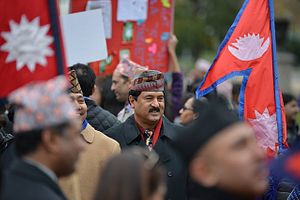The recent chaos and political turmoil in Nepal, which followed the promulgation of that country’s new constitution in September, shows what can happen when post-conflict societies attempt to move too fast following conflict. By not investigating war crimes and wartime abuses of power, Nepal risks disrupting its long term future as an equal post-conflict state.
The much heralded new constitution in August was naturally a moment of celebration, welcomed by political leaders as the dawn of a new Nepal. However, ever since the constitution was adopted, Nepal has been in the grip of protests, fuel blockades, and continuing insecurity. With protests in the Terai highlighting the unequal constitution, it is time for Nepal to address underlying ethnic and political tensions so that the country can move forward. While for many the passing of the new constitution was a time of celebration, for others it was a signal to take to the streets. The blockades in the Terai have been highly damaging to Nepal’s economy, and suggest that the promulgation of the new constitution is not the end of the struggle for equality, fairness and tolerance, but rather just the beginning.
Certainly the new constitution, notwithstanding all the criticism and the controversy surrounding it, is a step in the right direction. Major political parties have managed to overcome huge differences and form a consensus. However, as far as peace building and post-conflict reconstruction goes it is only one facet, even if a vital one, in meeting the demands and agreements in the Comprehensive Peace Agreement of 2006. The CPA also called for the establishment of a Truth and Reconciliation Commission, which was created to investigate grave violations of human rights and to hold accountable those responsible. The idea that those responsible for rape, murder, and gross mutilation, both from the Army and Maoists, are walking around with impunity is not conducive to long term peace and stability, which after all, was a fundamental reason for the establishment of the Truth and Reconciliation Commission (TRC).
As a state, Nepal is legally obliged to protect human rights, investigate violations, and ensure that victims have access to both justice and reparations. The role of the TRC is not limited to just holding guilty parties accountable; rather, its second objective is to create an environment conducive to sustainable peace and reconciliation by embracing good faith and tolerance on both sides. But a lack of action on the part of the TRC means that good faith and tolerance are in short supply, just when they are both sorely needed.
The need for proper reconciliation is clear. The case of Sri Lanka shows clearly that simply covering up wartime abuses and trying to move forward without addressing obvious concerns and divisions will not sow the seeds of unity. Time alone cannot heal all wounds. Sri Lanka was the scene of some horrific war crimes committed by both sides during its 25-year civil war, and a Lessons Learnt and Reconciliation Commission was created to draw a line under the conflict and provide people with the justice and answers needed to move on. However, the commission has been widely criticized by human rights groups for its lack of independence, limited mandate, and claims it was being used by both sides to conceal human rights abuses. In the words of Amarnath Amarasingam the committee, “is a kind of post-war pacifism that is too convenient for the victor, and ultimately disrespectful to the innocent.” As such, the commission has failed to reconcile the opposing sides. This simmering ethnic and internal division, hidden beneath the ad-hoc plaster of a commission, is entirely at odds with the long-terms goals and plans of Sri Lanka, and threatens to derail that country’s path of long-term stability. Sri Lanka is a clear lesson is how not to go about post-conflict reconstruction. Nepal should avoid making the same mistake.
Here in Nepal while we have a new constitution, we also have unrest and violence in the Terai and a society that almost 10 years on from the signing of the CPA has not benefited from reconciliation. Reconciliation only genuinely occurs with understanding, apologies and forgiveness. These have yet to take place.
The formation of a new constitution should never have been an end goal. A constitution does not automatically protect a country from internal divisions and abuses of power. Nepal’s problems will not magically disappear now that it has a new constitution. But the constitution is a tool that, if wielded correctly and with rational long-term planning, could bring change and inclusion. The change that Nepal needs and deserves is there to be had. It is up to the country’s political leaders to determine whether Nepal capitalizes on the opportunity, or squanders yet another sorely needed opportunity.
Maximillian Mørch is a post-graduate student living in Kathmandu writing about disaster management, politics and current affairs.
































